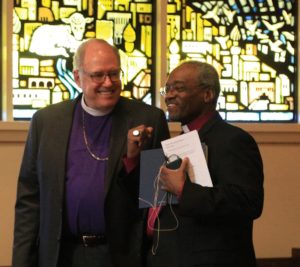The Fort Worth Star-Telegram published an Op Ed by Bishop Scott Mayer in the Saturday, May 26, 2018 edition. The online edition also included a photo of Mayer with Presiding Bishop Michael Curry, taken when Curry was in the diocese last April.

Sorrow, anger, delight, joy – how do we make sense of such a range of emotions? How, in a weekend in which we see school children murdered and lovers marry can we form right actions framed in God’s love?
This is the question Mayer answers in the article. And he lets people know that the love preached by Curry in England is also preached in Episcopal churches here in our diocese.
Read the article here or below.
Making Sense of Sorrow and Joy
The past few days have been an emotional roller coaster.
On Friday, we were horrified as yet another mass shooting in a school cast us into mourning.
Then early Saturday we delighted in a beautiful royal wedding, with Episcopalians especially reveling in the sermon preached by my brother bishop, the Most Rev. Michael Curry, presiding bishop of The Episcopal Church.
Later that same morning, local Episcopalians rejoiced at the election of a daughter of Fort Worth, the Rev. Carlye Hughes of Trinity Episcopal Church, as bishop of the Episcopal Diocese of Newark.
Sorrow, anger, delight, joy – how do we make sense of such a range of emotions? How, in a weekend in which we see school children murdered and lovers marry can we form right actions framed in God’s love?
In The Book of Joy: Lasting Happiness in a Changing World about a conversation between Archbishop Desmond Tutu and the Dalai Lama, the author and participant Douglas Carleton Abrams writes: “Some might wonder what our own joy has to do with countering injustice and inequality … and the suffering of the world.”
“. . .what the Archbishop and the Dalai Lama were saying is that the way we heal our own pain is actually by turning to the pain of others. It is a virtuous cycle. The goal is not just to create joy for ourselves but, as the Archbishop poetically phrased it, ‘to be a reservoir of joy, an oasis of peace, a pool of serenity that can ripple out to all those around you.’ We are most joyful when we focus on others, not on ourselves.”
In the shooting, the wedding, and for Episcopalians, the election of a bishop, we stepped out of ourselves to share in the sorrow, compassion, and joy of others.
And we needed to do so, for we live in a cultural context in which bad theology and a lack of mercy cause many to think of the Church as judgmental, dogmatic, and self-righteous.
The world needs someone to proclaim and embody the Good News of God’s grace, God’s forgiveness, God’s mercy, and God’s love which has the power to change lives.
The presiding bishop’s sermon had such an impact because Michael Curry tapped into the hunger of so many people for God, for an encounter with the Divine. Too often the world tells us we are not worthy of God’s love, that we are lacking, that we are not enough. But Curry knows God has another message for us.
New Testament scholar William Countryman says: “What God says to you in Jesus is . . something quite unambiguous: ‘You are forgiven.’
“What this means is, ‘I love you anyway, no matter what. I love you not because you are particularly good nor because you are particularly repentant nor because I’m trying to bribe you or threaten you into changing. I love you because I love you.’”
Bishop Curry is being called the “surprise star of the wedding” because he spoke a potent truth when he proclaimed, “There is a power in love.” And when he made it clear in so many ways that “If it’s not about love, it’s not about God.”
And here’s the thing – what Bishop Curry said in England is said in Episcopal churches in Fort Worth, indeed all over our church.
Because under the leadership of our Michael Curry, we in The Episcopal Church are increasingly clear that our calling, our peculiar voice, is to proclaim the Good News of God’s mercy, undeserved forgiveness, unmerited grace, and unconditional love to a culture starving for this Good News.
